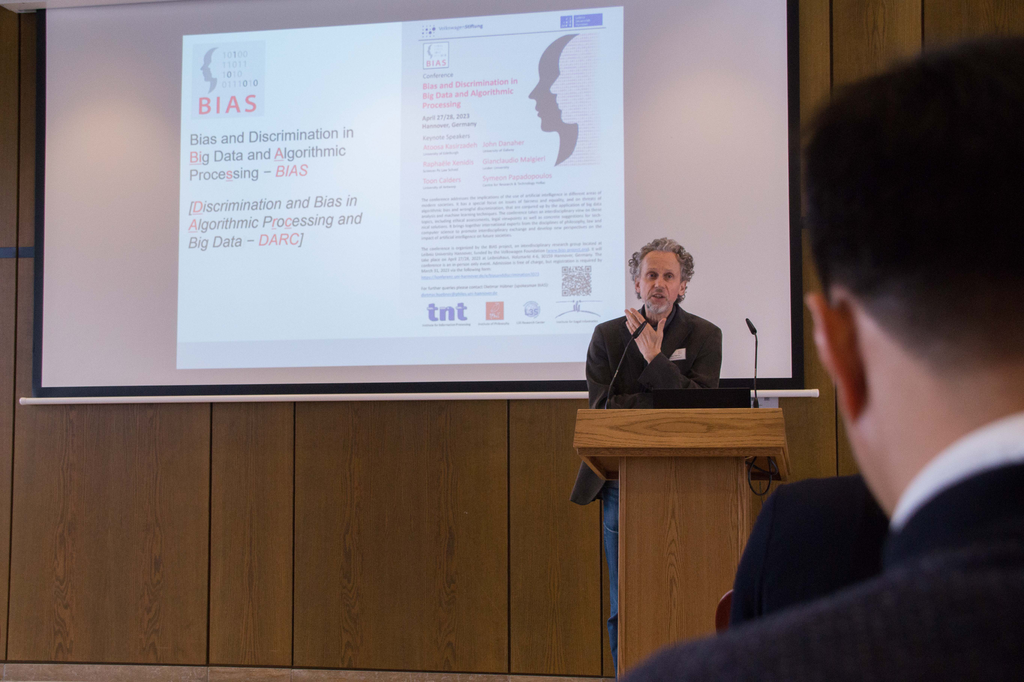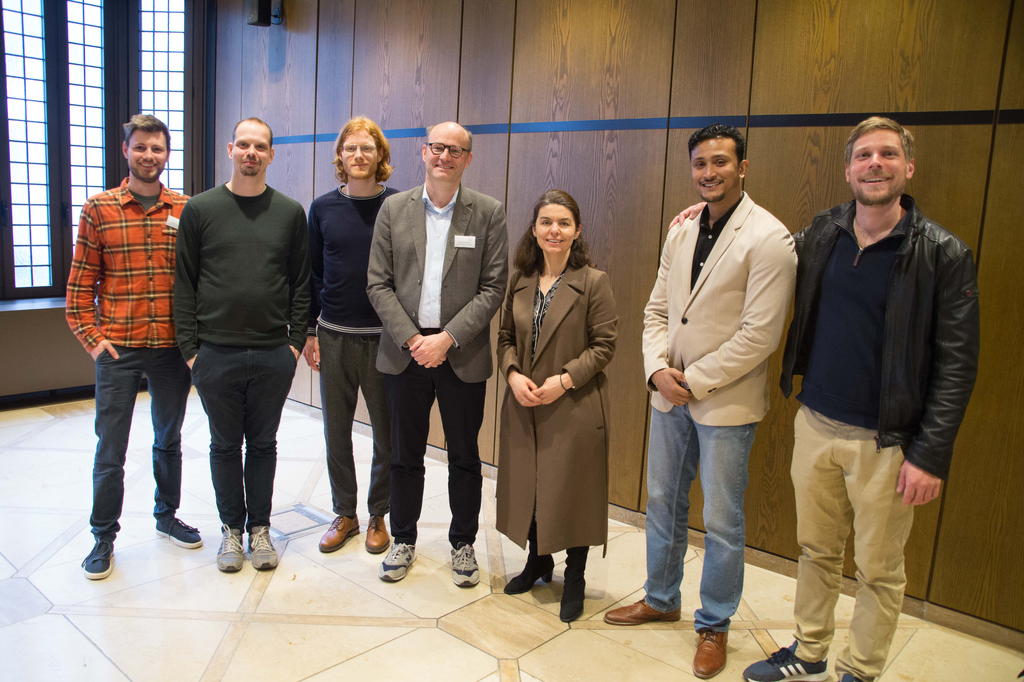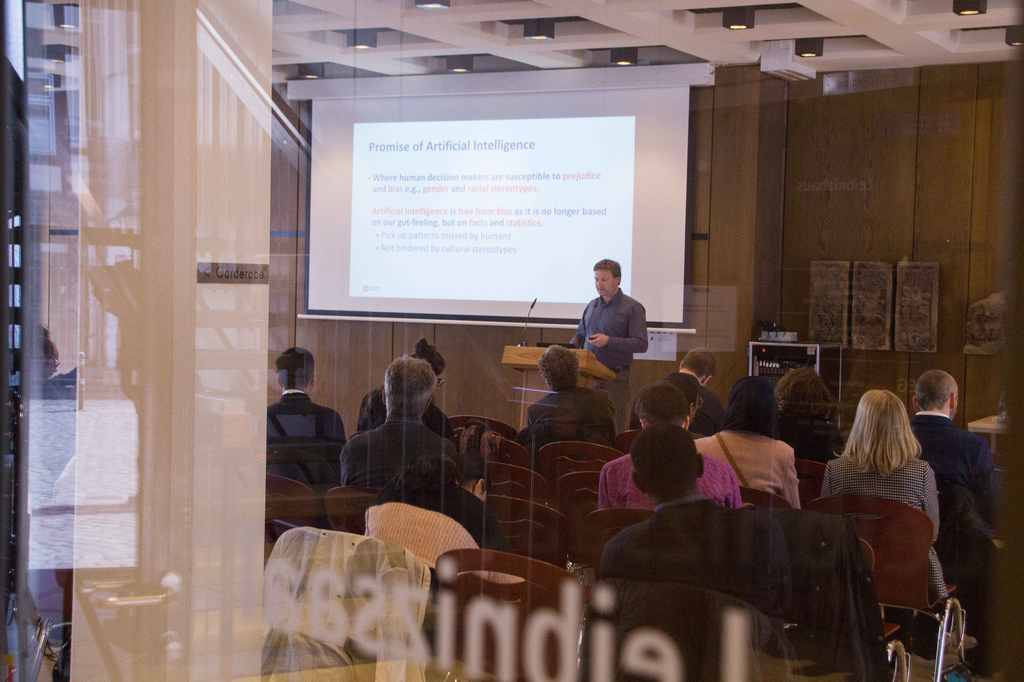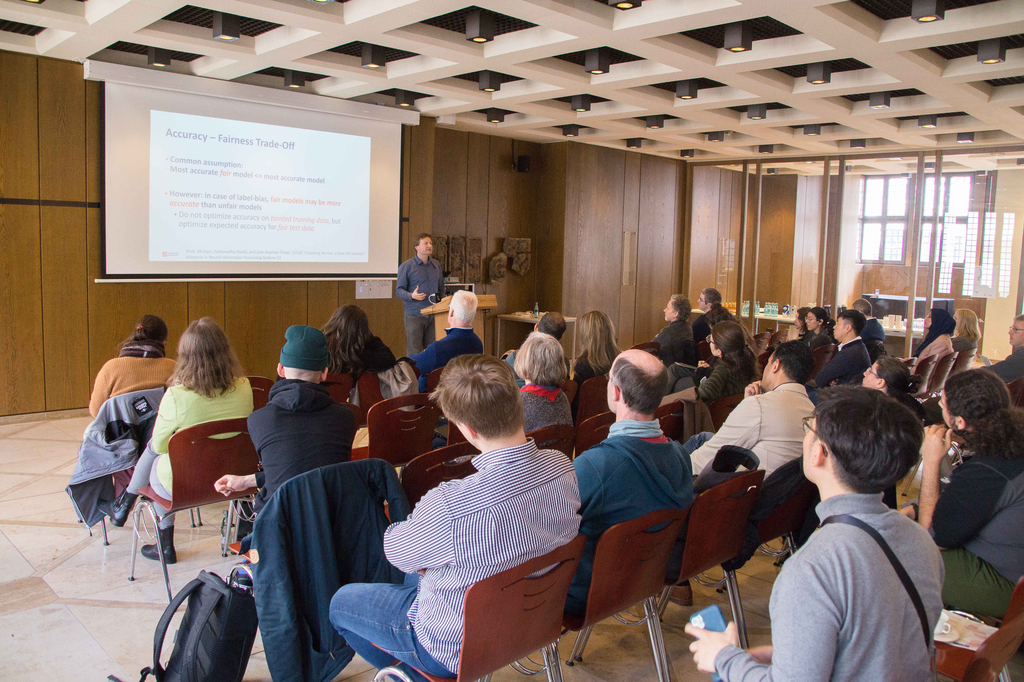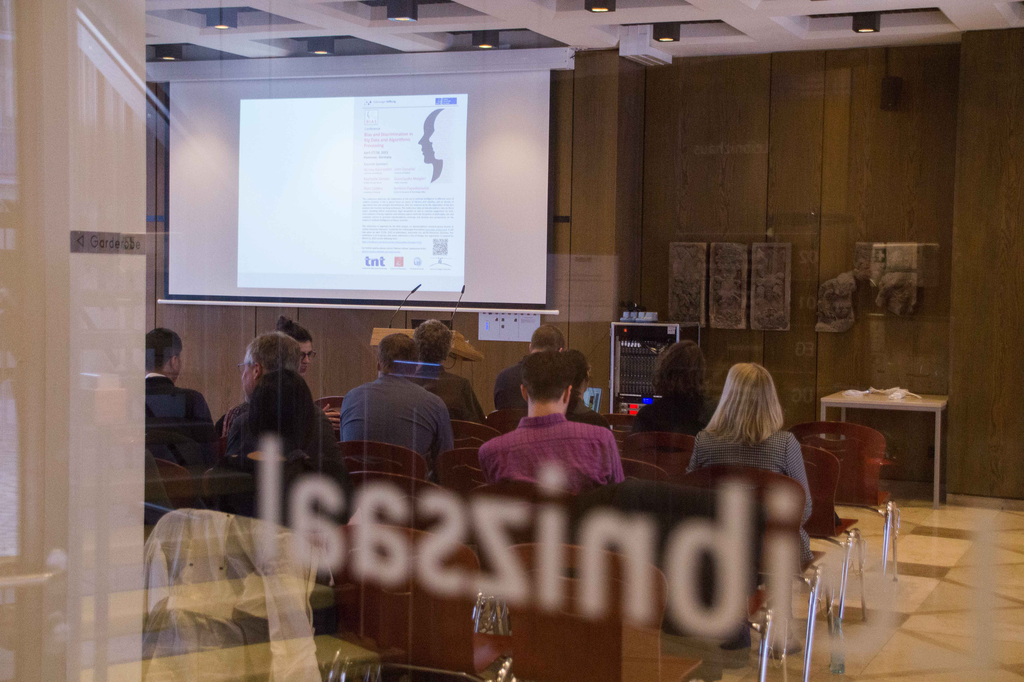Final Conference Concludes the Research Project
Our final conference on 28 and 29 April has brought inspiring perspectives and innovative work in the ambit of AI & fairness. The intense discussions confirmed the interest to engage in interdisciplinary work and exchange from all involved disciplines. The BIAS staff will continue their involvement with this intriguing field of research in the future. We thank all participants of the conference and hope to stay in touch.
A CE Marking for HAL9000? – Presentation on the AI Act at Leibniz University’s “Nacht die Wissen schafft”, 4 November 2023
Project member Jan Horstmann has introduced the upcoming EU Regulation on Artificial Intelligence (AI Act) at the science communication event “Nacht die Wissen schafft”. The presentation (in German) titled “Die KI-Verordnung der EU: Bekommt HAL9000 das CE-Kennzeichen?” was first presented at the BIAS project’s final conference and subsequently adapted for a broader audience.
Do we need a Right to ADM?
Jan Horstmann has presented some thoughts on the question at the Young Digital Law Conference “Bias in Law-Making – How Assumptions about Technology, Trustworthiness, and Human Agency underpin European Digital Law”, hosted at the University of Vienna from 5 to 7 July.
Christian Heinze has given a lecture on AI Governance at the Heidelberger Symposium on 13 May 2023.
Paper on Multi-dimensional Discrimination accepted for FAccT 2023
The paper “Multi-dimensional discrimination in Law and Machine Learning – A comparative overview” by project members Arjun Roy, Jan Horstmann and Eirini Ntoutsi has been accepted for presentation at FAccT 2023 and publication in the conference proceedings. A preprint version can be found in the arxiv.
Final Conference on 27-28 April in Hanover
The project’s final conference will be held at Leibnizhaus Hanover in April. The event includes internationally renowned scholars in algorithmic bias and fair AI, such as Atoosa Kasirzadeh (University of Edinburgh), John Danaher (University of Galway), Raphaële Xenidis (Sciences Po Law School), Gianclaudio Malgieri (Leiden University), Toon Calders (University of Antwerp) and Symeon Papadopoulos (Centre for Research & Technology Hellas).
Participation is free. Registration is possible until 31st March. To learn more & register, check out the poster (PDF) and the conference website.
Workshop Report
The workshop organised by working group B at the Institute for Legal Informatics (Leibniz University Hanover) has brought together young legal scholars, philosophers and others, with fruitful discussions about, among others, transparency for ADM and challenges that AI holds for anti-discrimination law. A full report by Marlene Delventhal can be found in ZD-Aktuell, 01405.
Workshop on Legal Issues of Bias and Discrimination
We happily announce our workshop on legal issues of bias and discrimination, taking place at the Faculty of Law of Leibniz University Hanover on 11th October 2022! The workshop is organised by working group B (Law) and brings together a number of young scholars in discrimination and IT law. You can find more information in the workshop programme.
Participation is limited. To register, please send us an email.
Algorithms & Discrimination: Online Lecture by Dietmar Hübner
Project member Dietmar Hübner has given a lecture titled “Computeralgorithmen und Diskriminierung” on 3rd June 2022 as part of the lecture series “Künstliche Intelligenz – Antagonismen in der Digitalen Revolution” (University of Applied Sciences Düsseldorf).
News Article: Negotiations for an AI Framework of the Council of Europe
Jan Horstmann has written (in German) about the negotiations on an international legal framework for the protection of human rights, democracy and rule of law by the Committee on Artificial Intelligence (CAI) within the framework of the Council of Europe (CoE). The article can be found in ZD-Aktuell 2022, 01182.
Expert Interview with Christian Heinze: Legal Issues and AI
Christian Heinze has commented on legal questions of AI, current legislative developments and the fascinating intersection of law and technology in an interview with the Konrad Adenauer foundation. The interview (in German) is available on YouTube.
“Was kann, darf und soll eine KI?”
In a panel discussion held at the Friedrich-Naumann-Stiftung, Christian Heinze participated as a speaker on the question: What can, may, and should an AI do?
News Article: Jurisprudence and Administrative Procedings regarding ADM
Jan Horstmann has published a contribution looking at recent judgements and administrative decisions in EU member states dealing with the GDPR rules on ADM and profiling (in German, ZD-Aktuell 2021, 05487). A number of decisions concerns the so-called “gig economy”, which may play a pioneer role in determining the exact ambit and legal consequences of said rules, Horstmann contends.
Christian Heinze on the EU Commission’s Proposal for an AI Regulation at the European AI Regulation Week
Christian heinze has presented the EU Commission’s proposal for an AI Act and its approach to bias during the panel “A human-centric approach to AI: Fairness in agreement with European values and regulation” at the European AI Regulation Week, Santiago de Compostela/online, 8 October 2021.
Workshop “Bias and Discrimination in Algorithmic Decision Making”
We are proud to announce that our workshop will take place on October 8-9, in an innovative hybrid format.
Including keynote lectures by Emily Sullivan, Christian Heinze, Markus Langer, and Kasper Lippert-Rasmussen!
Panel Discussion on AI with Dietmar Hübner
Dietmar Hübner has participated in a discussion on AI at Hannover Messe, 14 April 2021.
ECMLPKDD Workshop on Bias and Fairness in AI
Members of the BIAS team are co-organising the BIAS 2021: 2nd ECMLPKDD workshop on Bias and Fairness in AI, Bilbao, Spain, 13-18 September, 2021, https://sites.google.com/view/bias2021
Please submit your paper by 2 July!
Copenhagen Workshop on Algorithmic Fairness
Jannik Zeiser presented his paper, “Should We Believe the Algorithm? Fairness, Epistemic Responsibility, and Moral Encroachment“, at the Copenhagen Workshop on Algorithmic Fairness, on 13 November 2020.
News Contributions on Current Legal Developments
Jan Horstmann has published two news articles (in German) concerning a ruling of the Rechtbank Den Haag regarding a system involving automated profiling for the detection of illicit receipt of social benefits (ZD-Aktuell 2020, 07047) and a proposal for a local law in New York City regulating the use of automated employment decision tools (ZD-Aktuell 2020, 07141).
BIAS Team Member Wins Young Scholars Award
Jointly with Stefan Wallaschek, BIAS member Philippe van Basshuysen has won the Young Scholars Award 2020, awarded by the PPE Institute for Social and Institutional Change (ISIC) at Witten/Herdecke University.
New Corona Project within BIAS
IPhil (WG A) has received additional funding for research on the ethics of policy making in the COVID-19 pandemic.
Description: During the course of the pandemic, measures that would normally be unthinkable in liberal democracies, such as lockdowns, curfews, bans on free assembly, and digital contact tracing, have been implemented in many countries. The aim of this project is to investigate what kind of measures are justifiable in the exceptional circumstances of a pandemic. In this investigation, we focus in particular on digital contact tracing, weighing the efficacy of various configurations, and their possible implications for, among other things, privacy violations.
Team: Mathias Frisch (PI), Philippe van Basshuysen, Lucie White
First BIAS Workshop
The BIAS team (Bodo Rosenhahn and Eirini Ntoutsi) are organizing the “Bias and Fairness in AI” Workshop, co-located with ECMLPKDD 2020, Ghent, Belgium, on 14-18 September, 2020. Dietmar Hübner acts as one of the keynote speakers in this workshop.
Kick-Off Event “Artificial Intelligence and the Society of the Future”
Dietmar Hübner presented the BIAS project in the Kick-off Event of “Artificial Intelligence and the Society of the Future”, a symposium that took place in Herrenhausen Palace, Hannover, on 7-8 November, 2019.
Master’s Seminar “Philosophy and Ethics of Artificial Intelligence”
Philippe van Basshuysen offered a Master’s Seminar, “Philosophy and Ethics of Artificial Intelligence”, at the Institute of Philosophy of Leibniz University Hannover during Winter Term 2019/20. Please visit the Institute of Philosophy for all the interesting courses currently on offer!
Master’s Seminar “Justice, Discrimination, and Affirmative Action”
Dietmar Hübner offered a Master’s Seminar, “Justice, Discrimination, and Affirmative Action”, at the Institute of Philosophy of Leibniz University Hannover during Summer Term 2019.
